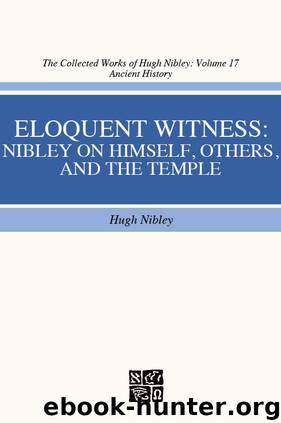The Collected Works of Hugh Nibley, Vol. 17: Eloquent Witness: Nibley on Himself, Others, and the Temple by Hugh Nibley

Author:Hugh Nibley [Nibley, Hugh]
Language: eng
Format: epub
Tags: Mormon, Hugh Nibley, Church of Jesus Christ of Latter-day Saints
Publisher: Deseret Book Company
Published: 2011-08-25T06:00:00+00:00
26
Graveside Service Address for Joel Erik Myres
In a week I shall have my ninety-first birthday. What do I have to look forward to after that? The answer—as much as I ever had. Are we going anywhere in this life? The other side is where the real work is being done: “There was a space granted unto man in which he might repent; therefore this life became a probationary state; a time to prepare to meet God; a time to prepare for that endless state which has been spoken of by us, which is after the resurrection of the dead” (Alma 12:24).
The history of the race, like the life of the individual, has been a succession of tests. They come in dispensations. Joseph Smith in one book has given us comprehensive accounts of seven great dispensations of the gospel. It was an exercise unmatched in “extreme scholarship,” yet we have ample means of controlling his account because of the rich apocryphal sources now known to the world. Each dispensation, which is a bestowal or handing down of the gospel by direct revelation, was immediately followed by general apostasy and wickedness.
Joel Erik Myres was married to a granddaughter of Hugh Nibley, Natalie Mincek. Myres passed away on 7 March 2001; this address was read at the graveside service held on 20 March 2001.
Adam and Eve “mourned before the Lord” (Moses 5:27), while their own offspring “loved Satan more than God” (Moses 5:18, 28). Enoch wept and “refuse[d] to be comforted” (Moses 7:44); he left the world with his righteous Zion to consign “the residue of the people” (Moses 7:20) to destruction. The flood had barely dried up when the people of Noah’s day were back to their old ways, “And the Lord said in his heart, I will not again curse the ground any more for man’s sake; for the imagination of man’s heart is evil from his youth” (Genesis 8:21). Abraham’s own parents turned from the gospel to the practice of idolatry and human sacrifice (Abraham 1:5–7), while his people went directly into four hundred years of bondage in Egypt, which they deserved. Hear Moses’ farewell address: “Behold, while I am yet alive with you this day, ye have been rebellious against the Lord; and how much more after my death?” (Deuteronomy 31:27).
Christ in his prophecies to the apostles predicted the destruction of Jerusalem and the scattering of the Jews as but “the beginning of sorrows” (Matthew 24:8)—two thousand years of them: “For then shall be great tribulation, such as was not since the beginning of the world to this time, no, nor ever shall be” (Matthew 24:21). And finally, Joseph Smith was shown a vision of the last days so terrible that he begged the Lord to take it away.
As far back as the record goes, people have been edified by great temple dramas depicting the creation, the council in heaven, Satan’s claim to complete control of the operation, and his expulsion from heaven. Joseph Smith has given us in the Book of Moses two such temple dramas, one starring Moses and the other Enoch.
Download
This site does not store any files on its server. We only index and link to content provided by other sites. Please contact the content providers to delete copyright contents if any and email us, we'll remove relevant links or contents immediately.
Still Foolin’ ’Em by Billy Crystal(36349)
We're Going to Need More Wine by Gabrielle Union(19034)
Plagued by Fire by Paul Hendrickson(17405)
Pimp by Iceberg Slim(14488)
Molly's Game by Molly Bloom(14133)
Becoming by Michelle Obama(10020)
When Breath Becomes Air by Paul Kalanithi(8426)
Educated by Tara Westover(8045)
The Girl Without a Voice by Casey Watson(7885)
The Incest Diary by Anonymous(7681)
Note to Self by Connor Franta(7663)
How to Be a Bawse: A Guide to Conquering Life by Lilly Singh(7471)
The Space Between by Michelle L. Teichman(6929)
What Does This Button Do? by Bruce Dickinson(6195)
Imperfect by Sanjay Manjrekar(5872)
Permanent Record by Edward Snowden(5838)
A Year in the Merde by Stephen Clarke(5417)
Shoe Dog by Phil Knight(5257)
Promise Me, Dad by Joe Biden(5141)
